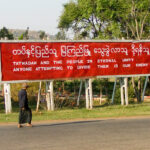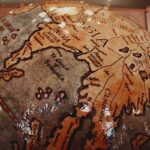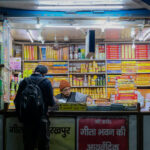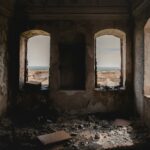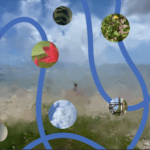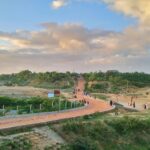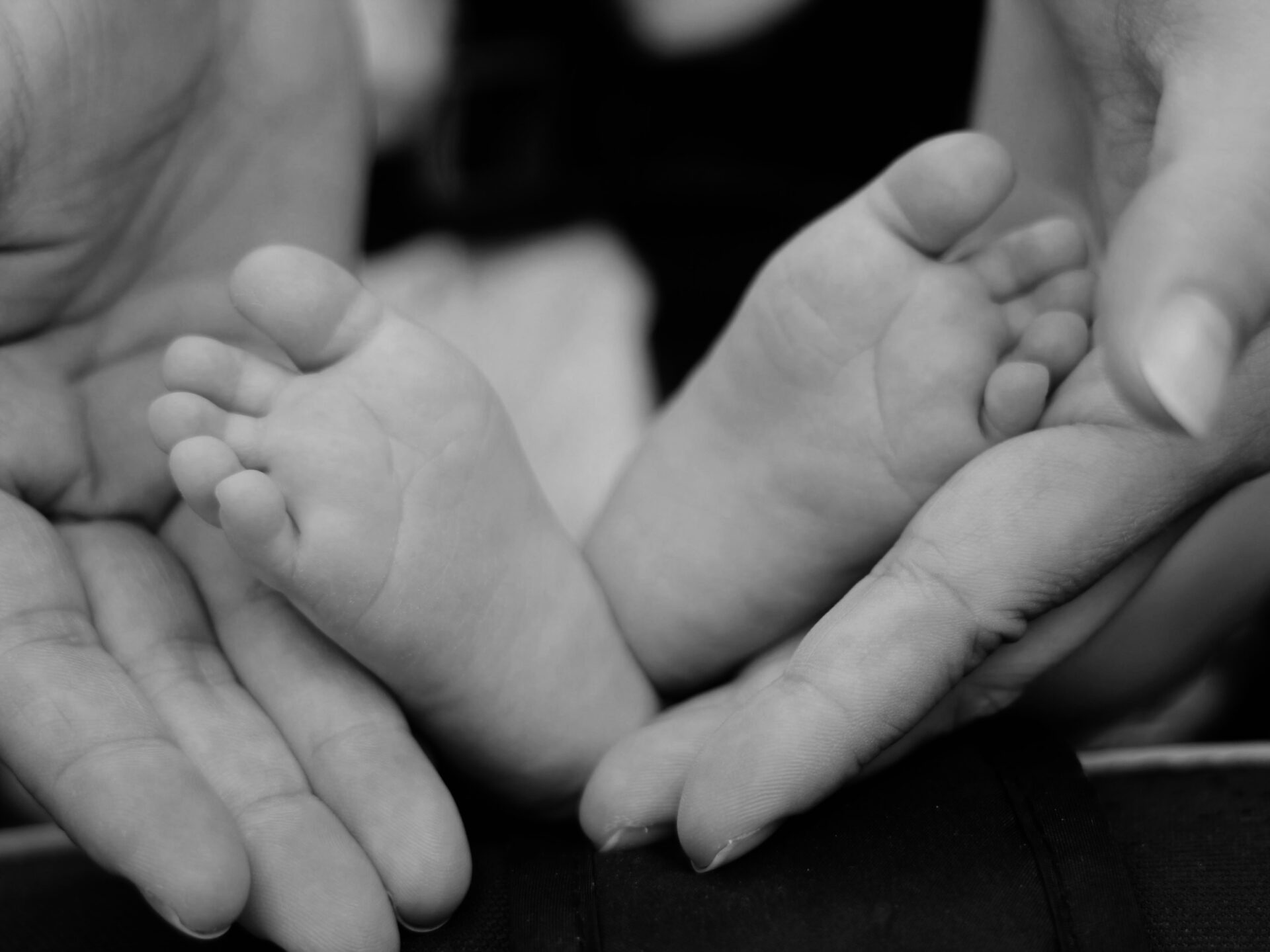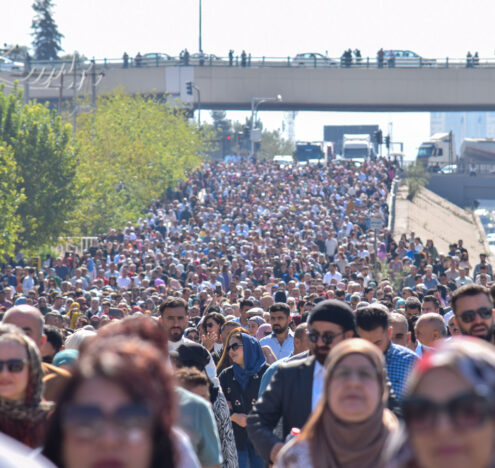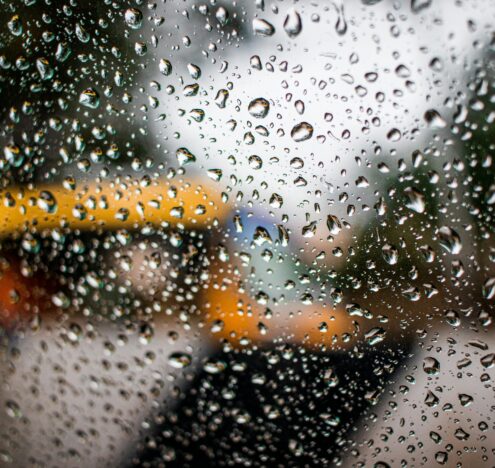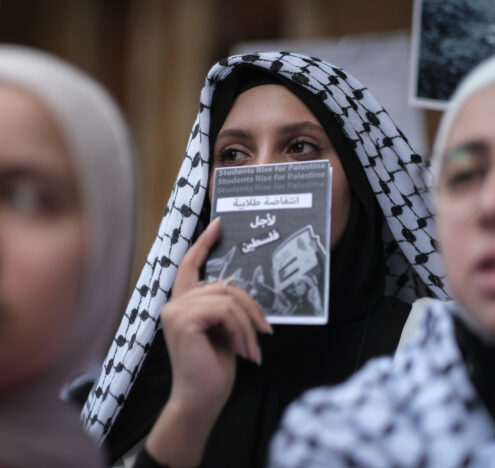Amidst the unyielding clamor of war in the Gaza Strip, where drones incessantly buzz above and buildings crumble under the impact of airstrikes, young mothers like Israa Al-Shorbaji find themselves at the heart of a struggle that marries the beauty of new life with the terror of conflict. As the conflict began, Israa, only 24, carried within her a life yet to bloom, while outside, the world she knew fractured and splintered.
“The first day of the war was the first day of my ninth month,” she recounts from her home in Jabaliya refugee camp, a haunted look crossing her youthful face. Her voice, hushed but clear, conveys the surreal reality of preparing for both birth and survival simultaneously. “Suddenly our area was threatened, and we had to evacuate to our relative’s house in another area in Jabaliya while I was in pain,” she recalls, her voice strained by the memory.
As the reality of a potential early labor set in, Israa was swept up in a tide of families fleeing through streets echoing with the cries of the dispossessed. “The streets were filled with the sounds of sobbing, the air thick with acrid smoke, and the horizon alight with the orange glow of destruction,” she said.
There are 50,000 pregnant women in Gaza and over 180 give birth every day, according to the UN. Maternal health experts warn that maternal mortality will likely increase given the difficulty of accessing medical care with the bombardment of hospitals. Women are giving birth in precarious situations without adequate support. The psychological toll of the conflict also has dire implications for the health of pregnant women and their children. The stress can lead to premature birth, miscarriage, and stillbirth.
A Treacherous Labor
Two days after her evacuation, Israa’s pain and terror grew when her water broke. Despite her worry about leaving her other children, Israa, along with her husband, took another risky journey to the closest hospital. While hospitals are meant to serve as sanctuaries for care and healing, in the current conflict they have become sites that mirror the tumult of the besieged city around them. There, Israa was diagnosed with premature birth.
“The shelling around the hospital was continuous and violent,” she says, her voice barely above a whisper. As her labor began, the stark contradiction between ushering in new life amid overwhelming death surrounded her. “We stood for long periods in the corridors with labor pain due to the fear of shrapnel,” she said.
It was within these walls, under the specter of ceaseless shelling, that Israa’s daughter came into the world. The name she chose for her daughter, Hiyam, which means “love” and “passion” in Arabic, is a testament to the love that persists even in the bleakest times — a love that Israa also hoped would connect the child to the grandmother, her namesake, who is currently separated from the family due to the conflict. “She was beautiful like an angel,” Israa muses. “She was tiny, a delicate being seemingly unaware of the chaos of her birth.”
A Dangerous Journey
The newborn’s first cries were swiftly overshadowed by the urgency to evacuate as the hospital became a target. Israa recalls that she “cradled her, not with the peace of a maternity ward, but with the haste of a battlefield,” the sting of the moment palpable in her words. With her newborn daughter in her arms, Israa navigated her way back to the presumed safety of her relative’s house. However, it brought no respite. Israa describes the harrowing return trip as a tableau of devastation where fear of what might happen next overshadowed every action. Each corner turned and every street crossed was a negotiation with fate under the surveillance of drones, the arbiters of life and death from above.
The fleeting solace found within the walls of a relative’s home was ephemeral for Israa and her family. The moments following Hiyam’s birth were but a brief interlude in a relentless symphony of uncertainty. “I barely had time to catch my breath, to embrace my children in a reassuring hug,” Israa recounts, her voice breaking with emotion. “And then, like a dark cloud that refuses to pass, the threat of bombing cast its pall over us once more.” Tears streaked her cheeks as she spoke, each one a testament to the unyielding tension gripping her heart. “The very place we sought refuge was now under the shadow of Israel’s threats,” she lamented, the precariousness of their safety a constant specter in their disrupted lives.
So she set off on another risky journey to another relative’s home in Rafah, in the southern Gaza Strip. Israa, her husband, and their newborn daughter navigated through scenes of devastation that would mark Hiyam’s first journey through the world.
Today, Israa’s home is where her relatives gather, a cradle for her family’s fragile normalcy amid the uncertainty. Her husband searches tirelessly for medical care and nourishment for their newborn, a quest that mirrors the broader struggle for survival that the people of Gaza face daily — another saga of survival amid the scarcity of medicine.
“She was beautiful like an angel. She was tiny, a delicate being seemingly unaware of the chaos of her birth.”
Israa Al-Shorbaji
Israa looks down at Hiyam, now a one-month-old symbol of hope, as she contemplates the future. “Our life is in limbo; our house is destroyed,” she says. “I used to dream of returning to our home,” Israa said, her voice a mix of nostalgia and despair. “It was where I dreamt of raising my children and watching Hiyam take her first steps.”
As Israa cradles Hiyam, now a symbol of fragile new beginnings in a world of unending trials, her gaze is drawn inexorably to the uncertain horizon. The resilience of her spirit, mirrored in the steadfast hearts of Gaza’s mothers, speaks volumes of a hope that refuses to be extinguished. Each day brings the same unresolved question: What does tomorrow hold for a family born, surviving, and persisting under the shadow of siege?
In Hiyam’s innocent eyes there lies a silent plea for peace and a life beyond the confines of conflict — a longing shared by all who have known nothing but the echo of war. With each sunrise, Israa’s resolve is tested, yet her love, as boundless as the sea surrounding the strip, offers a beacon of light in the pervasive darkness. It is this love that will guide her and Hiyam through the maze of their existence, searching for a path toward dawn where the sounds of children’s laughter might one day drown out the sound of drones and the thunder of artillery.


